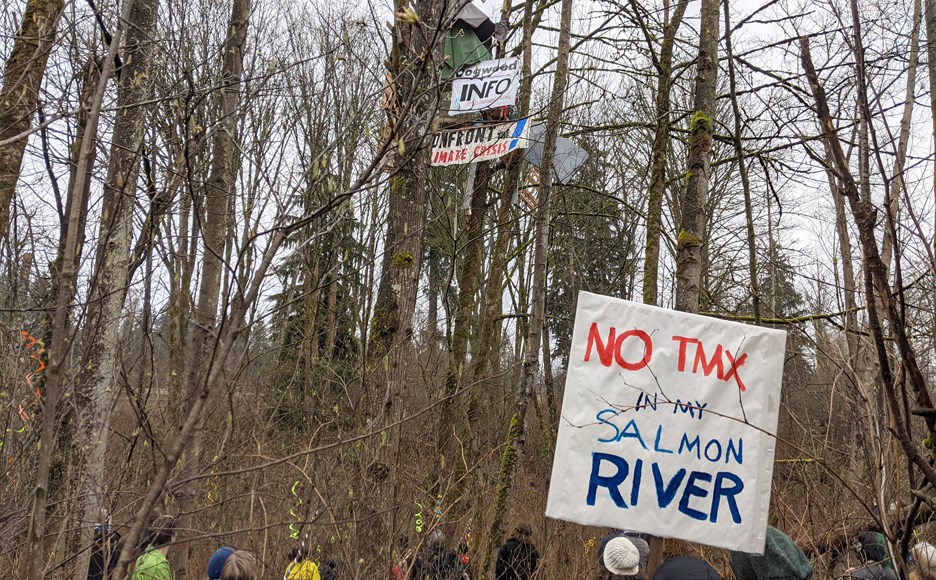Environment and Climate Change Canada (ECCC) has confirmed that following federal inspections the Trans Mountain pipeline expansion project that is clearing land by cutting trees in Burnaby has been ordered to halt operations.
Early last week, ECCC enforcement officers visited the TMX work site at the Brunette River Conservation Area following a tip from a local activist group called the Community Nest Finding Network (CNFN). According to an email from ECCC, the officers identified nests of Anna's hummingbirds and sighted other migratory bird species in the area, including Song Sparrows, Pine Siskins, American Robins and Black-capped Chickadees.
“Given that it is nesting season, migratory birds are particularly vulnerable at this time,” the email reads. “Cutting vegetation and trees or carrying out other disruptive activities such as bulldozing or using chainsaws and heavy machinery in the vicinity of active nests will likely result in disturbance or destruction of those nests. The disturbance or destruction of a nest of a migratory bird is a contravention of the Migratory Birds Regulations.”
We are thanking the hummingbirds who nest in us.
— 1308Trees (@1308Trees) March 31, 2021
We are also mourning our fallen relatives, murdered by the Trans Mountain pipeline expansion.
We are urban forests who deserve the chance to become old growth forests.
Pictures of the #TMX violence in @CityofBurnaby today #StopTMX pic.twitter.com/cQ9VUDIgmR
Members of the Community Nest Finding Network reported the chainsaws had fallen silent ever since the inspection on Monday, April 12. The ECCC confirms those claims as enforcement officers had told the crown corporation that day to “immediately cease any activity, work, or undertaking” on the work site referred to as Construction Work Package 98 or CWP-98 located along an approximately 1,100-metre stretch of land.
'Qualified Environmental Professionals'
The company was also directed to erect and maintain clearly visible signs for the purpose of restricting access by the public, employees or contractors to the work area.
In a statement from Trans Mountain last week the company said they have "Qualified Environmental Professionals" who determine environmental best practices for the company. In light of the NOW’s confirmation of the ECCC’s order, we asked Trans Mountain how these environmental professionals did not prevent the project from contravening Migratory Birds Regulations.
Trans Mountain’s response, sent via email on Tuesday, maintains the company’s policies and procedures for the protection of migratory birds and their habitat were “developed in consultation with stakeholders and communities” and were “extensively reviewed by federal and provincial regulatory authorities.”
Reviewing procedures
The statement reads on to say that Trans Mountain’s migratory bird mitigation measures are consistent with guidelines set out by Environment and Climate Change Canada, the Canadian Wildlife Service and industry best practice.
As for how Trans Mountain is moving forward, the company says it is committed to continuous improvement of all environmental programs and is “reviewing its procedures for the protection of migratory birds during construction.”
Currently, Trans Mountain is working with ECCC to determine when work in the area can recommence. While there is no specific end date mentioned, according to the Migratory Birds Convention Act of 1994 an order can only last up to 180 days.





